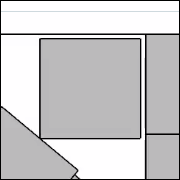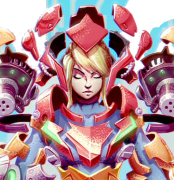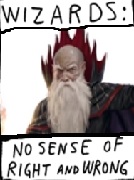|
I don't think anyone is suggesting (at least at this point) that if you get into a battle then you suddenly enter the Initiative Dimension where minions pop out of nowhere and the NPC suddenly refreshes all their spells and powers. And the current DnD5e developers don't think so either which is probably part of the reason that the more utility-ish spells are still explicitly per-day spells. You're free to edit encounters as you wish and always have been. If you do something cool pre-battle that should've really worn out a baddie then you still get to have them missing some of their health when the real battle starts, or have some of their resources used up, and so forth. -- As far as the PC/NPC comparison in abilities goes, I'm fine with it being asymmetric simply on the basis of "this NPC hasn't lived the same life and training you have". DnD uses the stereotype of the 'healing priest in the temple' and I'm totally fine with 'healing priest in a temple' being a totally different skillset than 'cleric' and so they have some totally wack healing abilities but also only 10 HP. It's whatever.
|
|
|
|

|
| # ? May 31, 2024 23:57 |
|
Raenir Salazar posted:My understanding is this, with a "Stat Block" style NPC, you have a specific set of encounter powers and abilities, because the idea is they exist for that one encounter. With a Player, their abilities are expected to last over the entire length of time of the Adventuring "Day". To a player's PoV, this is a little sketchy because its kinda like they got to prepare to ambush the players with abilities for free, when they should spent time preparing for that and at some point given the players opportunities to notice and react to someone spying on them, potentially disrupting their plans and affecting what abilities and resources they can have available for a fight. I agree with this assessment, but I also think that the vast, vast majority of encounters are with fresh NPCs that have appeared for just this encounter and you only need to consider their abilities from that perspective. There are certainly corner cases where interrupting a daily resource (such as a spellbook or minions) should have an appreciable outcome in a combat encounter. Even catching a spellcaster after they've clearly used some of their abilities beforehand should have an effect on their combat outcome. However, I also don't think that the hypothetical need to cross out a few of their resources is worth the cost of simulating PC-style NPCs in canon products. Doing so at the table is fine and fun if that's what you want but it shouldn't be the default style of play at all tables for all encounters. I mostly need to reach into a bag and pull out an NPC that I can use right now. If an NPC exists long enough for me to worry about how the players are loving with their resources I can probably afford to take some notes and adjust some things to suit the fiction.
|
|
|
|
Well, I'm not saying you should be expected to pick NPC things from the PHB like a menu. What I am saying is that if an NPC does a cool thing, it's reasonable for a player to ask about that cool thing, within the context of the fiction, and ask to explore learning how to do that cool thing themselves. Not in an obnoxious rules lawyer-y "um excuse me, where exactly is this spell?" sort of a way, but in a "wow that's awesome, how can I do that too?" sort of way. I also think it's important that NPC abilities be broadly, conceivably balance-able against PC ones, even if in practice they'd need a lot of work to implement. The teleportation example is just top of mind because I'm running a PF2e game. I wanted a friendly NPC wizard to just say "see ya" and teleport away, something that had no influence on the story and was incredibly unimportant, just a flashy way of leaving (as opposed to just walking away like a regular person), but since this was PbP I double checked to make sure it was something the PCs maybe could do too in the future. When I researched it, I saw that they made a special effort in PF2e to limit teleportation significantly compared to 3e or Pathfinder 1e. Spellcasters in general, whether PCs or NPCs, generally do not have the ability to quickly teleport long distances. So, I decided not to have the wizard do that. In contrast, I have an NPC magus (spellsword) who has some kind of lightning empowerment special effect thing going on. I have no idea how it works mechanically, and there's no core magus feature about that in the way I expect it works. It doesn't really matter how it works, even if it ever shows up in combat I'll just build the NPC as a monster. However, if a magus player really wanted to do the same thing, I'd come up with some set of class features and feats roughly in balance to the current ones to represent it. Most importantly, what I'm imagining this NPC can do is still essentially in line with other magus PCs and NPCs. Even if the features stay NPC exclusive, because I don't trust myself to fully work out all the details in a way that's balanced for a PC, they're still broadly the sort of thing "a magus" can do in the fiction, while teleporting long distances quickly is not something spellcasters can do in the fiction, in PF2e. I think that the rules of the game can influence what "the fiction" is. The game can set certain expectations about what powerful people can and can't do. You can expect that the PCs are heroic individuals, and if the rules of the game suggest something is ludicrously impossible for a PC to do, an NPC shouldn't be able to do that thing without some kind of explanation. Again, there can totally be exceptions, but I think it's preferable to keep those limited, and have a clear and distinct reason, and when playing a game like PF2e (D&D 5e might be a little more loosey goosey) to not just improvise random things that are way out of line of PC capabilities. A big bad that can teleport because they're the teleporting guy, blessed by Fharlanghn or wearing the legendary boots of here to there or the necklace of many keys or whatever is a different issue than randomly having some loving wizard teleport as a throwaway stunt because you forgot that's supposed to be really hard in this system.
|
|
|
|
player characters work differently to npcs because player characters are the main characters and are literally built different. the math is fundamentally different design paradigms. npcs as player classes doesnt work in 5e and goes against the entire point of the game. players have way more options available to them. enemies, who are expected to only be fought once and then never again, have simpler, more flavourful attacks.
|
|
|
pog boyfriend posted:player characters work differently to npcs because player characters are the main characters and are literally built different. the math is fundamentally different design paradigms. npcs as player classes doesnt work in 5e and goes against the entire point of the game. players have way more options available to them. enemies, who are expected to only be fought once and then never again, have simpler, more flavourful attacks. The DMG explicitly states you can create NPCs with player class levels as antagonist, and provides the Oathbreaker and Death Priest classes specifically for this purpose. The math is an incoherent mess where the MM averages don't line up to the awful DMG monster system, so arguing that there's any kind of coherent intent here is somewhat difficult because the books themselves aren't clear. Also a lot of the player options are just trash while monsters get a lot of strictly better stuff for no reason. The CR 4 banshee has a better 1/day ability than almost any 9th level spell in the game (which isn't even that imbalanced in player hands as legendary resistance exists) while finger of death is an inconsequential damage dealer with the secret effect of making the other players roll their eyes and ask why you didn't bring something good like forcecage. There's a reason they had to emergency nerf polymorph from the alpha PHB, because people were realizing the monster attacks were much better than anything available to players.
|
|
|
|
|
It's not a competition tho? Whatever method you use to generate your NPCs you're going to want them to be balanced to provide a fun fight. If your PCs are fully optimised combat monsters you'll give them higher CR opponents than if the same size party was not well optimised for combat. So who cares if the banshee has an ability PCs don't have?
|
|
|
|
TheGreatEvilKing posted:The DMG explicitly states you can create NPCs with player class levels as antagonist, and provides the Oathbreaker and Death Priest classes specifically for this purpose. The math is an incoherent mess where the MM averages don't line up to the awful DMG monster system, so arguing that there's any kind of coherent intent here is somewhat difficult because the books themselves aren't clear. thank you for disagreeing with and then proving my point in the same post. characters and monsters are built different. a pc has 6-8 encounters per day, an enemy combatant has 1 per life. using player classes to grab abilities is great but the average player character build is radically different from comparable npc statblocks, as they should E; consider that an "enemy adventuring party" style encounter of 4 fighters with archery style, sharpshooter, and longbow, are statted like PCs, and yet if they all pop sharpshooter and action surge from over 500ft away this breaks the game completely and the encounter is no fun. things like that are important when it comes to understanding 5e encounter design pog boyfriend fucked around with this message at 13:58 on Oct 5, 2021 |
|
|
|
pog boyfriend posted:player characters work differently to npcs because player characters are the main characters and are literally built different. the math is fundamentally different design paradigms. npcs as player classes doesnt work in 5e and goes against the entire point of the game. players have way more options available to them. enemies, who are expected to only be fought once and then never again, have simpler, more flavourful attacks. In my game most NPCs have player levels and everything seems to work just fine? I think this sort of absolutism is a tad unsupported. I think the point of the game depends on what the players *want* from the game which was the point of my posts which is to look at things from the perspective of player expectation, narrative and mechanical. And there are absolutely certain around as either allies or antagonists where it obviously makes sense to be stated up like a player.
|
|
|
|
Raenir Salazar posted:In my game most NPCs have player levels and everything seems to work just fine? I think this sort of absolutism is a tad unsupported. I think the point of the game depends on what the players *want* from the game which was the point of my posts which is to look at things from the perspective of player expectation, narrative and mechanical. those are both wrong, it doesnt make sense to have enemies statted up as a player because the game is built around players conserving resources around 6-8 adventuring days and therefore have way more options than npcs, which are built to be fought one time and then defeated. for players npc allies there are explicitly sidekick rules for this but player character as npc ally makes more sense, just so long as you avoid being a dmpc. lower level player classes to help the players is.. fine, i guess? i would still rather just have them have one or two class abilities instead of a full player class with all the bells and whistles
|
|
|
|
Quick Fog Cloud question: spaces in the area of effect are heavily obscuredquote:A heavily obscured area—such as Darkness, opaque fog, or dense foliage—blocks vision entirely. A creature effectively suffers from the Blinded condition (see Conditions ) when trying to see something in that area. --Both people inside the cloud, advantage/disadvantage cancel out. Combat works as normal. --Person at range outside shooting at person inside (edge or middle), vision is blocked so attacker has disadvantage, but does it cancel out with the defender? --Person inside shooting out, vision blocked if in the middle of the cloud, but what about the edge? Does attacker have disadvantage on the shot since the defender is treated as blinded trying to see him? --Melee fighters on the Fog Cloud border. Feels like it should be different to ranged but is it? I have Fog Cloud and Blind-Fighting so I get to ignore any of that, but I'm trying to figure out how much it helps/hinders my allies.
|
|
|
|
It's not wrong to have NPC's with a PC statblock if you really really want to. But it's a poo poo ton more work to run.
|
|
|
Bruceski posted:Quick Fog Cloud question: spaces in the area of effect are heavily obscured There's an underlying assumption in what you're asking that the attacker knows the location of the target somehow, which I don't think is necessarily true. I'd rule that it would proceed as normal for the first two, with advantage and disadvantage cancelling out, if the attacker chooses the correct square to attack. If it's any turn after when the darkness went up, I don't think that's a given. There should probably be some kind of check to know where to attack and if it fails, they attack an empty square or make the attack randomly. Passive perception/whatever above a certain level would make it an automatic success, as with any trivial check. For the third and fourth, I'd handle it the same way as the first and second unless the attacker steps out of the Fog Cloud, attacks, then steps back in. In which case the player makes a normal attack and anyone attacking them has to pick the square where they think they are. Dancing in and out of a Fog Cloud like this is an absolutely valid tactic to get them to attack the wrong place, but since they can't see the attack coming, I'm inclined to handle it as a normal attack with advantage and disadvantage cancelling out if they attack the correct location. If the PC wants to do something clever like peek out and attack, I'd rule that to get beyond the magical blindness, they need to move out the full 5 ft., make their attack, then move back in. If they want to stay half in and half out, I'd be inclined to treat it like cover and use the rules for that instead. Not saying my approach should be authoritative, but that's how I'd handle it for my players. Azathoth fucked around with this message at 18:10 on Oct 5, 2021 |
|
|
|
Facebook Aunt posted:It's not a competition tho? Whatever method you use to generate your NPCs you're going to want them to be balanced to provide a fun fight. If your PCs are fully optimised combat monsters you'll give them higher CR opponents than if the same size party was not well optimised for combat. So who cares if the banshee has an ability PCs don't have? Banshee is really notable for having an ability players used to get as a 9th level spell at CR 4, same with the beholder ray being strictly better than Flesh to Stone. I don't care that I can't get mind flayer blasts, but having strictly worse abilities sucks. pog boyfriend posted:thank you for disagreeing with and then proving my point in the same post. characters and monsters are built different. a pc has 6-8 encounters per day, an enemy combatant has 1 per life. using player classes to grab abilities is great but the average player character build is radically different from comparable npc statblocks, as they should You are giving the 5e designers too much credit. There are three different enemy systems that all produce completely different enemies because the end goal is to "feel like DnD". You get similar rocket tag abilities as your sharpshooter example by running things like hobgoblin devastators that use the same spells as players and add their own arbitrarium to drop 11d6 fireballs as a CR 4. There are a pile of rocket tag monsters in the game, I dunno why you think PCs are the most egregious.
|
|
|
|
|
pog boyfriend posted:those are both wrong, it doesnt make sense to have enemies statted up as a player because the game is built around players conserving resources around 6-8 adventuring days and therefore have way more options than npcs, which are built to be fought one time and then defeated. for players npc allies there are explicitly sidekick rules for this but player character as npc ally makes more sense, just so long as you avoid being a dmpc. lower level player classes to help the players is.. fine, i guess? i would still rather just have them have one or two class abilities instead of a full player class with all the bells and whistles The idea that its wrong as in the wrong way to play or DM a game doesn't pass the smell test for me; you say its wrong but you are clearing making an argument that's just saying "You can do it this way, which I think is better" is not the same thing as demonstrating that the alternative is wrong. Like my DM's campaign is usually designed as a mirror to the players; important npc's get class levels, they use the exact same stat block the player rolled (we used the one I rolled which was by luck identical to the Elite array, which results in increased difficulty as all the npc enemies have good stats); some enemies and npc's don't get class levels and this largely mechanically means that if they die, they die right away no saving throws. NPC's with class levels get saving throws. This has huge implications, often meaning buying us time to revive an NPC we're particularly attached to who as it turns out, is also useful to have with the party. As an example, the kid who fell out the window I mentioned before only survived because he had 1 level in fighter which he had in order to maintain the ludonarrative; that he was a kid training to be a knight and wanting to go on adventures; otherwise he would've went splat and died. I think the latter was more interesting and reflects the additional level of thought and care the DM is putting into reinforcing the narrative the players experience. I'm having fun, my largest point of contention has almost always been the other players, but the actual campaign and how the DM DM's has gone perfectly fine. TheGreatEvilKing posted:Banshee is really notable for having an ability players used to get as a 9th level spell at CR 4, same with the beholder ray being strictly better than Flesh to Stone. I don't care that I can't get mind flayer blasts, but having strictly worse abilities sucks. IIRC Mind Blast is a 3rd level evocation spell in UA.
|
|
|
|
TheGreatEvilKing posted:You are giving the 5e designers too much credit. There are three different enemy systems that all produce completely different enemies because the end goal is to "feel like DnD". You get similar rocket tag abilities as your sharpshooter example by running things like hobgoblin devastators that use the same spells as players and add their own arbitrarium to drop 11d6 fireballs as a CR 4. There are a pile of rocket tag monsters in the game, I dunno why you think PCs are the most egregious. E: Raenir Salazar posted:The idea that its wrong as in the wrong way to play or DM a game doesn't pass the smell test for me; you say its wrong but you are clearing making an argument that's just saying "You can do it this way, which I think is better" is not the same thing as demonstrating that the alternative is wrong. i used to dm pathfinder 1e for money and class levels on npcs/enemies was the worst thing i ever experienced, it was like a fun black hole that was easily in the top 10 worst things in that worthless system. statting out an entire npc was a lot of effort, the npc was only used once(if at all), and if i made them too effective i instantly killed a pc which ruined the fun for everyone. when i even got to run the statted npcs i only used like 1/3rd of what they were capable of before the enemies died, making the entire process a tedious waste of time. pog boyfriend fucked around with this message at 19:14 on Oct 5, 2021 |
|
|
|
The corebook says explicitly that character classes don't represent mechanically-replicable regimens of study but rather a rare, heroic X-factor not present in all people. Most people who learn how to swordfight aren't Fighters. Most people who read up on magic aren't Wizards. Etcetera. Your character levels and class abilities actually represent an arbitrary wellspring of talent that isn't trivially available to everybody. ...but this cuts both ways. Just like your Cleric or Ranger or whatever is on an entirely different level from a regular priest or wilderness scout or what have you, an unusually talented, powerful, or blessed NPC you meet might be on an entirely different level from you. They might have abilities your class either can't easily replicate or can't replicate at all. Unfair? Life is unfair! That's why most of the NPCs you meet can't keep up with you no matter how hard they try! What, did you sit down to play with the tacit understanding that you, like you personally, were just going to represent the qualitative apex of ability as measured across all humanoids everywhere?
|
|
|
|
Oh huh. There was rumors of a Minsc and Boo book, and it exists. https://www.dmsguild.com/product/365114/Minsc-and-Boos-Journal-of-Villainy-5e?src=newsletterDMsGuild10052021
|
|
|
Azathoth posted:There's an underlying assumption in what you're asking that the attacker knows the location of the target somehow, which I don't think is necessarily true. Unless someone is hidden (such as by taking the hide action), you know where they are, even if you don't see them. Houseruling it so unseen enemies are automatically hidden just buffs spells like fog cloud, darkness, and invisibility way too much. I suppose doing it your way would be reasonable if someone also cast silence on the fog cloud.
|
|
|
|
|
Raenir Salazar posted:
I missed the story - but please tell me there's a joke I missed and this isn't being presented as a good, cool thing.
|
|
|
|
dwarf74 posted:That sounds like a parody of D&D. None of that makes sense. It's all the bad things rolled together - npcs with class levels as reality, hit points as reality, the reluctance/inability to accept the game's rules can't or shouldn't be used for everything that happens in the narrative... welcome to the 5e thread, please leave your burning hot immovable rod buttplugs at the door
|
|
|
|
dwarf74 posted:That sounds like a parody of D&D. None of that makes sense. It's all the bad things rolled together - npcs with class levels as reality, hit points as reality, the reluctance/inability to accept the game's rules can't or shouldn't be used for everything that happens in the narrative... Not sure if it qualifies as a joke but one of the players almost died jumping out the window and doing a superhero landing on the ground as he took exactly enough falling damage to hit zero hp trying to help the kid? I don't really get the rest as to what you're saying though. Hit points within the game world are real yeah? You don't want to reach zero. NPC's also have hitpoints; it wouldn't be fair to the players fighting an NPC if the DM said "Uh nope they're not dead yet" when they are? Isn't that obvious? I also don't really see what you mean by a reluctance or inability to accept the games rules; everything we've been discussing is 100% supported in the DMG, stat'ing a NPC with player rules isn't actually against the rules, what's actually against the rules because I'm not aware of any of them being against the rules. And even if they were isn't Rule 0, "Whatever the DM says"? Doesn't that cover any grey area?
|
|
|
|
dwarf74 posted:That sounds like a parody of D&D. None of that makes sense. It's all the bad things rolled together - npcs with class levels as reality, hit points as reality, the reluctance/inability to accept the game's rules can't or shouldn't be used for everything that happens in the narrative... it might be fun in a comedy game where everyone is super aware of the game mechanics..? im at a loss here too
|
|
|
|
Okay I think I see where the misunderstanding is. No, I never said anything about the player characters being aware of the game mechanics; I was only referring to the players who know they are playing a game with all that entails. It's why I repeated "player expectations" and other game design jargon a lot in my posts and even alluded to ludonarrative dissonance.
|
|
|
|
Raenir Salazar posted:Not sure if it qualifies as a joke but one of the players almost died jumping out the window and doing a superhero landing on the ground as he took exactly enough falling damage to hit zero hp trying to help the kid? You don't need them to take hp damage from the fall, because they don't need hp and hp aren't a real thing, just a rules convenience. You don't need them to have a fighter level so they have more, because class levels aren't a reality. You don't need a training justification to get there, because of all the above. People can survive falls - it happens. None of the whole sequence of events you described is necessary. It's a long, winding, silly rules-as-physics road to a destination that's not worth visiting. It's pushing game rules into places where not only are they unnecessary, they're frankly unwelcome. e: Re: your next post, no, I didn't assume that. That's not an issue I'm having, here.
|
|
|
|
Yusin posted:Oh huh. There was rumors of a Minsc and Boo book, and it exists. I wonder if this will tie into Baldur's Gate 3. That takes place a century after the second game and Minsc is rumored to be the ranger that can join the player's party... except he's just a normal human? So maybe this book explains how they're both still kicking around
|
|
|
|
There was a comic where he was petrified or something, and revived later. Maybe that is what's going on?
|
|
|
|
From what a friend told me about said comic, either Minsc got petrified and revived, or the current Minsc was a statue of Minsc that got True Polymorphed/Animated into being alive.
|
|
|
Blooming Brilliant posted:From what a friend told me about said comic, either Minsc got petrified and revived, or the current Minsc was a statue of Minsc that got True Polymorphed/Animated into being alive. I hope it's the latter, that's just 
|
|
|
|
|
Sometimes when you use the rules as simulations, weird or even fun things emerge from that. That's what emergent gameplay is, after all, and it feels satisfying when it works. Most of us itt, I think, would agree it's not worth the cost and you get wonky results as often as you get cool ones. But I mean there's no reason to treat OP like they're crazy we all see what they're talking about.
|
|
|
|
Yusin posted:Oh huh. There was rumors of a Minsc and Boo book, and it exists. What a weird mishmash of BG1&2 nostalgia. At least Heroes of Baldur's Gate had an adventure arc to tie it all together. Regardless, thanks for posting the link. I am a sucker for this sort of thing. Azathoth posted:I hope it's the latter, that's just Agreed. That's how you make a Minsc who's even more Minsc.
|
|
|
|
dwarf74 posted:It was a kid falling out a window. Pog boyfriend's post right afterwards made me think that is where the impasse was: pog boyfriend posted:it might be fun in a comedy game where everyone is super aware of the game mechanics..? im at a loss here too Anyways, what your approach lacks is that it removes a degree of agency from the player by removing potential failure state. As an example, if the character in question did die, then as the last people seen with him, that half of the party might have been at best exiled from the town and into the dangerous wilderness resulting in a much more difficult campaign. We'd have have that possibility taken from us going with your approach; there are pros and cons to both approaches and being a game it depends on the players in our discussions with the DM and what style of campaign we're expecting. Mendrian posted:Sometimes when you use the rules as simulations, weird or even fun things emerge from that. That's what emergent gameplay is, after all, and it feels satisfying when it works. Most of us itt, I think, would agree it's not worth the cost and you get wonky results as often as you get cool ones. But I mean there's no reason to treat OP like they're crazy we all see what they're talking about. This. I completely agree, yeah its more effort, and that's not always worth it but in this case that's what the DM decided to do and it seems to be working for us.
|
|
|
|
I mean the whole idea of D&D is that you've got an elaborate rules system to create predictable yet emergent interactions, and a dungeonmaster to mediate and transform those outcomes into a coherent narrative. I think most would agree you need both parts. The rules create the circumstance where a player jumps out a window and nearly dies trying to save an NPC, and the DM connects that to past choices and the context of the larger plot. It's ok for the DM to nudge the hitpoints one way or another to tell the story they want, so long as that story remains informed and reflective of what is going on mechanically due to the player actions.
|
|
|
|
change my name posted:I wonder if this will tie into Baldur's Gate 3. That takes place a century after the second game and Minsc is rumored to be the ranger that can join the player's party... except he's just a normal human? So maybe this book explains how they're both still kicking around PeterWeller posted:What a weird mishmash of BG1&2 nostalgia. At least Heroes of Baldur's Gate had an adventure arc to tie it all together.
|
|
|
|
Yusin posted:This is from the same guy that made Heroes of Baldur's Gate, but hired by Wizards to make a second thing. (I heard he was also hired onto the video game staff.) Ahh, that makes sense. Looking through the PDF, this is very much a companion piece to HoBG.
|
|
|
|
Raenir Salazar posted:Pog boyfriend's post right afterwards made me think that is where the impasse was: If the PCs are trying to save a kid from falling out a window, you've got a lot of tools for that and none of them involve... well, any of that.
|
|
|
|
Raenir Salazar posted:Anyways, what your approach lacks is that it removes a degree of agency from the player by removing potential failure state. I don't know that it does. If anything, relying on the game mechanics here removes more agency because the outcome that may result in a failure state is dependent on a dice roll rather than player action. It'd be one thing if you telegraph the kid being about to fall out the window and gave an opportunity for players to intercede. In that case, the failure state is entirely dependent on player action. If they choose to try to grab him, or feather fall him, or whatever, then cool, game goes on as normal. If not, he falls and dies and then you've got your failure state. But having his survival depend on a random damage roll imposes an outcome on the players.
|
|
|
|
How many hp does the kid lose if he just breaks an arm?
|
|
|
|
El Fideo posted:How many hp does the kid lose if he just breaks an arm? 
|
|
|
|
El Fideo posted:How many hp does the kid lose if he just breaks an arm? they get one level of exhaustion
|
|
|
|

|
| # ? May 31, 2024 23:57 |
|
dwarf74 posted:What kind of agency could be removed, here? This isn't a character, it's an NPC. How would anything be more difficult? What possibility are you missing that's not a complete artifact of rules being used where they don't need to be? I just explained in that post? Agency without consequence for a lot of people doesn't seem like we're making real choices. The fact that there is a potential consequence for failure is what is taken away if we go with what you claimed, that HP isn't real and we just arbitrarily decide he survived his fall. We could equally arbitrarily decide he didn't; and inflict a harder campaign on the players, I'm not sure how you can't see how the result might not be satisfying to a given group of players with one result and unfair in the other. He fell because he failed his reflex save or acrobatics check, it doesn't really matter but the point was that the DM and the players in turn, prefers that things don't just happen just because; that they happen as an emergent result of the rules. The dice decided there was a fall, the character was in that position to fall because of the actions of the players; and likewise because of their actions no one was present who could say, dash down the side of the wall and do a sick backflip to catch them and then the dice decided the player who jumped out after them got knocked down to 0 and the kid managed to survive instead instead of the dice deciding for one and for no reason at all, not for the other. This goes back to what I contributed to the discussion two pages ago and waaaay earlier back in a different discussion is that sometimes players like it when the NPC's in the game play by the same rules they do. Dark Souls, Bloodborne and their "Dudes in Armor" as Hbomberguy put it is an example of this; for people playing it as a video game this is a very attractive approach because its more predictable. GHOST_BUTT posted:I don't know that it does. If anything, relying on the game mechanics here removes more agency because the outcome that may result in a failure state is dependent on a dice roll rather than player action. It'd be one thing if you telegraph the kid being about to fall out the window and gave an opportunity for players to intercede. In that case, the failure state is entirely dependent on player action. If they choose to try to grab him, or feather fall him, or whatever, then cool, game goes on as normal. If not, he falls and dies and then you've got your failure state. But having his survival depend on a random damage roll imposes an outcome on the players. As I explained above the player has plenty of choice leading up to those rolls, to me whats a large chunk of the game is working around and accounting for the roll. As an example with my blood hunter I dislike my odds when using blood curses with my low DC so I made the choice to use a blood malediction that uses no save, I made a choice to lose a potentially useful ability to immobilize an enemy in exchange for doing consistently more damage assuming a white featureless plane. The players in this scenario excersized a number of choices; they accepted a deal with a devil to kidnap the character in exchange for a boon instead of slaying it (and risking party wipe); they then entered a manor to do the deed without much preparation or planning; they then talked to the character and confessed in order to lower their guard and then walked out the room leaving them alone which the kid uses to make his escape (presumably the DM did a roll to see what the kid decides to do as he's done that in other similar situations, morale checks etc); I don't remember the next moments but presumably there was a choice, like to stay and either to try to rescue the kid or talk him out of whatever his decision was; which put the party again in a position where they can be more easily arrested if they continued to gently caress it up. One of them also made a choice to jump out the window. The two die rolls were: "Does the player jumping out survive?", "Did the kid fall?", and "Did the kid survive his fall?" In every case the player actions were what led to these rolls being rolled. Otherwise, taking it to its logical conclusion, why even roll for attacks or saves during encounters? If we're just leaving it up to chance and that also takes away agency? In the end, D&D to me, is a game with rules where the results of decisions are determined by dice rolls with a metagame around mitigating those rolls and these rules and dice are used to abjudicate the moment to moment story telling because it isnt the DM telling us what is happening, its the players making decisions within the world the DM is presenting; and since it is still a game there exists a meta that the individual players want to "beat" or have an advantageous relationship in regards to in order to feel like that they are "doing well" as part of what constitutes "fun". dwarf74 posted:You can't break an arm in D&D if you're serious about using HP as meat physics. The DM actually broke out the Injury tables; the player who jumped got a scar on his arm and the kid has broken ribs. e: Page 273 in the DMG. Raenir Salazar fucked around with this message at 21:49 on Oct 5, 2021 |
|
|





































